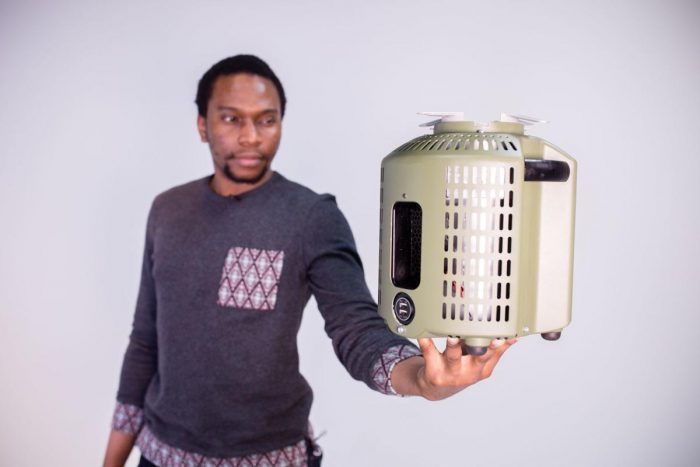Maxwell Chinnah remembers figuring out how to get to the United States after graduating from high school in Nigeria.
“I recall when I got the mission packet,” said Chinnah. “My papa was like, ‘Let’s pull out a table’ and he spread the whole thing on the table. He said, ‘Ok, let’s figure out how we’re going to pay for this.'”
The planning and everything that followed eventually culminated in the creation of the Genesys cook stove. The Genesys is a device similar to a portable Coleman camping stove, except it captures the energy released from the heat it creates, enabling people to recharge mobile devices even if they are hundreds of miles from a wall plug.
Chinnah’s father — an electrical engineer and “a numbers guy” by Chinnah’s description— spent time with his son years ago to budget his eventual trip over seas. Thankfully, because of scholarships and his father’s help, Chinnah was able to make his dream of an American education come to fruition.
“The educational system in my country is not really something you can write home about, ” said Chinnah. “They’re facing changes; the political landscape is highly unstable.”
That’s why he sought an education in the U.S. and ended up attending Watburg College in Waverly, Iowa, studying computer science. While attending, he met his eventual business partner, Godwin Attigah from Ghana.
He first realized he wanted to be an entrepreneur during one of his assigned projects.
“There was an exercise the professor said we should do… draw a genealogy map of our family and some of the professions some of our forebears and ancestors worked in that were important to them,” Chinnah recalled. “I just thought, ‘Oh boy, when will this semester be done? I just want to be done with this.’”
But he went along with it. Through the exercise, he made connections between what his relatives had done. His grandfather was a trader who traveled across West African countries. His mom grew up on a farm and his father started his own electrical engineering company.
“Once I went through the genealogy assignment it really helped cement the idea that I should be doing this,” Chinnah said. “That was really the exercise I’ll say that wrapped this thing with a nice little bow if you will, that really gave me the conviction to make me want to do this.”
Out of college and eager to make an imprint on the world, Chinnah and Arrigah started brainstorming different products they could create and sell under their new company, Terraoak, Inc. Eventually, they landed on Genesys.
“One thing we’ve realized, to be quite candid, is that a lot of ideas don’t succeed,” Chinnah admitted. “There’s a whole graveyard of ideas that don’t come to success not because they weren’t good ideas or because they weren’t innovative enough, but because they weren’t put in front of the right people.”
According to Chinnah, the thing that makes Genesys the right idea is the passion behind its creation The item itself is a smokeless, portable cookstove that stores the energy produced from its fire inside a battery for later use via USB port.
Though the battery mainly powers an interior fan to make a cleaner burn possible, the fire generates enough power to also charge devices at approximately 2.5 amps through it’s USB outlets. If they are successful, the plan is to make the product available in countries struggling with smoke pollution and a ready and consistent supply of electricity. Though the Genesys stove isn’t on the market at this point, the pair hopes to launch a Kickstarter for the item later this fall.
Though exact numbers on how much the stove — which currently only exists in prototypes — could cut down on those emissions are not available, Chinnah feels they’re pursuing worthy ends.
“For us, you know, we’ve lived through this, it’s very real and very personal to us, so that’s number one,” he said. “It doesn’t take a rocket scientist to convince anyone with any sense that we need to do something about climate change. If you get out of your bubble you can see the effects of climate change in our world.”

 Latest5 days ago
Latest5 days ago
 Trends6 days ago
Trends6 days ago
 Health1 week ago
Health1 week ago
 Football1 week ago
Football1 week ago
 Football1 week ago
Football1 week ago
 Latest1 week ago
Latest1 week ago
 Health1 week ago
Health1 week ago
 Latest1 week ago
Latest1 week ago

